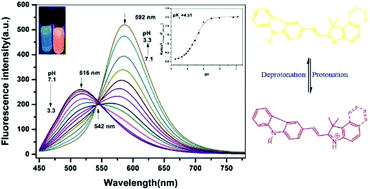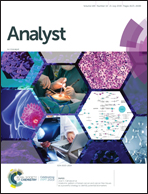Novel long-wavelength emissive lysosome-targeting ratiometric fluorescent probes for imaging in live cells†
Abstract
Lysosomes are acidic organelles containing many hydrolytic enzymes responsible for degrading macromolecules. Aberrant lysosomal pH changes are known to associate with lysosomal dysfunctions linking to various diseases including cancer and neurodegenerative disorders. Thus, it is of paramount importance to monitor lysosomal pH changes in order to investigate the pathological conditions. We report herein two novel, highly sensitive and fast responsive carbazole-based ratiometric fluorescent probes with different emission wavelengths, namely MCDBI and MCDI for lysosomal pH detection and imaging. Importantly, the MCDBI and MCDI probes bearing indole and benzoindoles as acid-sensing sites exhibit pKa values of 4.26 and 4.51, respectively, which are ideal for the quantitative analysis of lysosomal pH changes in living cells. These probes exhibited a strong pH-dependent behavior and responded linearly and rapidly to minor pH fluctuations. Moreover, the two biocompatible probes are highly lysosomal targeting, sensitive towards H+ over metal ions and some bioactive molecules, and exhibit excellent photostability and good reversibility. These probes have excellent cell membrane permeability and are further applied successfully to monitor lysosomal pH fluctuations in the lysosomes of HepG2 cells.



 Please wait while we load your content...
Please wait while we load your content...